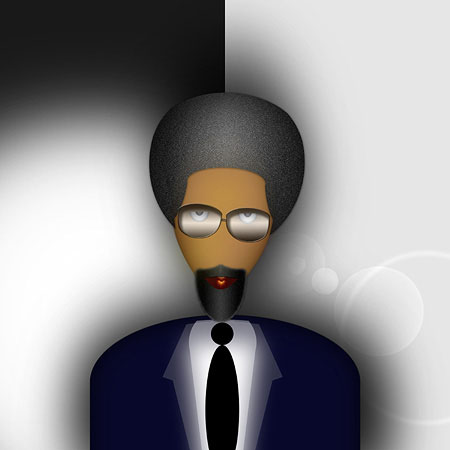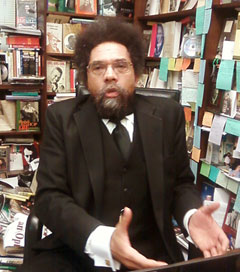
Can America’s collective economics inform who we are as a people, whereby – through obsessive bean-counting – we sculpt our destiny, tacitly sanctioning the stripping of basic dignity from fellow citizens, the erosion of civil liberties, the evisceration of public education policies, of the arts and humanities, bankrupting entire communities, tarnishing longstanding values of the populace and its self-image, thus ultimately destroying all that was once valuable to society?
For even after the world swooned from the megahype of England’s latest royal wedding and the hip, hip, hurrah of President Obama’s ordered assassination of Osama bin Laden, a cornucopia of catastrophic socioeconomic horrors – in addition to America’s continued unpreparedness for natural disaster – still face this nation: endless war, long-term unemployment, swelling prison populations and multiple years of record-breaking home foreclosures.
All of these problems may be well on their way to becoming the new normal in the US, but they won’t be here to stay if a certain brilliant, black man of prophetic word and deed can help it – namely, Dr. Cornel West.
West equates America’s banking elite with gangsters and deplores President Obama’s choice to surround himself with their minions – Timothy Geithner, Larry Summers et al. This well-heeled phalanx of criminals is, in West’s view, to blame for many, if not most, of America’s current ills.

In a moment when the clatter and chatter of austerity economics has reached a fever pitch, West observes that some elected officials and policymakers want to take austerity to yet another level of penny-pinching belt-tightening, which almost always means cutting America’s already-anemic social programs to depressed new lows of paucity. The union-busting in Wisconsin and elsewhere assures the near-irreversibility of those lows.
It would seem money is tight, except when it comes to finding $100 million a day to drop bombs on Libya. That’s a peculiarity that serves as proof that, no matter how supposedly broke the country is, the American government seems to always have a blank check handy for certain things, such as the ambiguous and wildly unsuccessful war on drugs, and the war on terror.

President Obama once embodied the promise of a glorious future for this nation. In these times, however, West points out that Obama’s leadership more or less represents a renaissance denied, a platform of unfulfilled assurances.
President Obama, he said in an interview with Pulitzer Prize-winning journalist Chris Hedges, is the, “black mascot of Wall Street oligarchs and a black puppet of corporate plutocrats.” Yet such criticisms come much to the chagrin of some African-American heavyweights like Al Sharpton, who recently appeared on MSNBC saying that, “too many of us are putting it all on the president,” and Melissa Harris-Perry, who wrote in an article published in The Nation that many of West’s comments were “utter hilarity.”
West stands firmly by his remarks. For all the president’s super-sophistication and caviar oration, in West’s view, the enduring fact remains that almost everything Obama has chosen to put in place, such as the Summers-Geithner economic team, spells business as usual. This pattern leads to one to question: does hope minus change equal more of the same … a la Dubya?
“To be human, you must bear witness to justice,” West writes in his book, “Hope on a Tightrope,” for, “[j]ustice is what love looks like in public.” It’s an idea that West is passionate about, even though truth and justice might seem antiquated in this waterboarding, Guantanamo Bay world where wars of aggression have become commonplace.
Nevertheless, in a podcast recorded in his Princeton University office on April 27, 2011, West dug deep into his passion for justice and his kinship and empathy for the poor and working class, and also shared what it means to be a “funkmaster.” It was an electrifying conversation in which West spoke frankly about the Obama administration and the unfolding developments in Egypt and other nations of that region. He also spoke about some of the more private joys in his life, such as the particulars of his favorite musical legends. This discourse came after enjoying a shared round of homemade gourmet cookies from renowned cake masters Ellen Baumwoll and Cheryl Kleinman at Betty Bakery in Brooklyn. It was a chat that found West imparting wisdom about the critical importance of Franklin Delano Roosevelt’s (FDR) Works Projects Administration (WPA) as an example from which America could be learning. He also provided some illumination as to why Obama has not chosen the course of reigniting FDR’s grand civic plan in a way that is appropriately nuanced for today.
“For me, I come out of a black freedom movement that is on intimate terms with death,” West says. “The social death of slavery … civic death, Jim Crow … psychic death, taught to hate ourselves … but America,” he says “is a death-dodging, death-denying, death-ducking culture – so they clash.”
In the dialogue, West spoke of the power of love, too, illustrating the idea by holding up Malcolm X and Dr. Martin Luther King Jr. as both a unified field and contrasting manifestations of what love means in action:
West explains what it means to be a “funkmaster,” while also commenting on America as a “death-dodging, death-ducking, death-denying culture.”
West makes a comparative analysis of the respective legacies of MLK and Malcolm X.
West talks about the two forms of a new Jim Crow offered by the Democratic and Republican parties, also speaking to the “gangster-like” activities of President Obama’s big-banking allies on Wall Street. West shares his understanding of casino capitalism and what he calls “turbo-capitalism.” West also explains why President Obama is unlike FDR.
In this clip, West says the left in America has been pushed out to the wilderness – the “poor people demonized, poverty criminalized, trade unions scapegoated,” while at the same time we saw “prophetic churches, mosques and synagogues marginalized.” West comments on President Obama’s choice to prop up Wall Street by placing the very people who destroyed the US economy – Timothy Geithner, Larry Summers, et al. – on his economic team.
West talks about President Obama’s unwillingness to make mention of poor people in his 2011 State of the Union Address and asserts that Obama’s economic team has no care or concern for the poor.